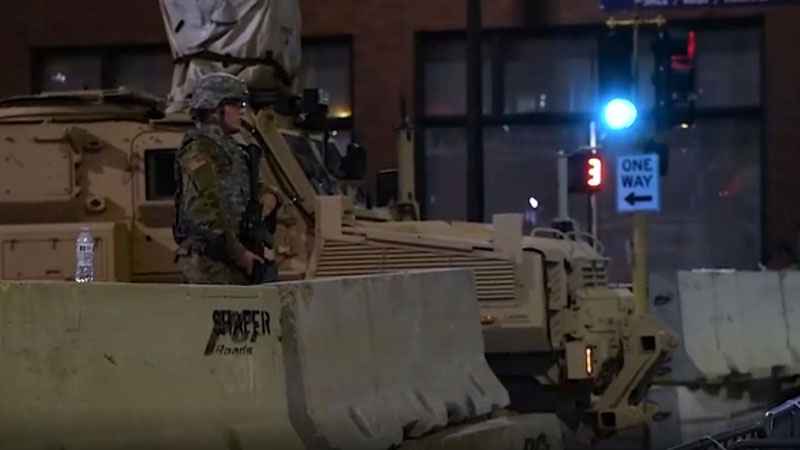Operation Safety Net: Success or ‘nightmare?’
[anvplayer video=”5025962″ station=”998122″]
Operation Safety Net, the 12-week mission that stationed thousands of troops and police officers around the Twin Cities during the Derek Chauvin trial leaves behind a controversial legacy.
While officials argue the unprecedented mission succeeded in keeping people and buildings safe and secure during a tense period of time around the state, others argue it militarized the community already dealing with trauma.
“I think Operation Safety Net failed miserably,” said Jaylani Hussein, executive director of CAIR-Minnesota, a group that has been critical of the operation since it was set into motion.
“To some neighbors, it may present them a peaceful solution, to others it presented insult to injury, and to many people — who may not even know — they’ve been fully traumatized by this military might,” Hussein said.
That trauma, whether or not fully realized in the moment, is what some experts feared could happen with an unprecedented domestic deployment of the military.

[KSTP]
Tim MacArthur, a law professor at George Mason University, warned about the lasting impacts during an interview back in December, when 5 INVESTIGATES first reported on Operation Safety Net after obtaining internal plans.
“We’re not used to seeing soldiers with weapons outside of military installations,” he said.
More from KSTP:
From riots to COVID-19, record-setting year marks dramatic shift in role of National Guard
No one predicted those resources would be called on to quell unrest following another police shooting in Brooklyn Center during the final days of the trial.
“It was a nightmare,” Hussein said, adding that the constant clashes with protestors in Brooklyn Center were unnecessary and out of line, turning the community into a war zone.
“People need to take a step back and realize that it’s not the protesters who are the problem. It’s the law enforcement,” he said.
But law enforcement officers, including members of the guard, were met with their fair share of resistance. Officials say those patrolling outside the Brooklyn Center Police Department had bottles and bricks tossed at them over the barricades.
In Minneapolis, some members of the guard were shot at while sitting in their Humvee downtown.
National Guard leadership declined an interview with 5 INVESTIGATES, but Hennepin County Sheriff David Hutchinson defended the mission.
“If we didn’t have Operation Safety Net, it would have been a much different outcome in Brooklyn Center,” he said.
Hutchinson called it a success, saying buildings didn’t burn and there were no serious injuries.
“People have the right to their own opinion, and I would say that nobody wants to see the military on our streets, including myself,” he said. “But we had to be prepared. We cannot allow what happened last year in our great city.”
Hutchinson also pushed back on criticism that the use of less-lethal rounds on the crowd of protests went too far, arguing that it was a proportional response based on the escalating violence and threat to the police station they were guarding.
The day after a jury convicted former MPD officer Derek Chauvin on all counts, officials with Operation Safety Net announced it would slowly dismantle by sending troops home and begin the process of removing barricades.
While it’s unclear if the scale of future operations will mirror what the community saw during the Chauvin trial, Hutchinson reiterated the importance of doing so if there’s another trial.
“Operation Safety Net will be back,” he said.